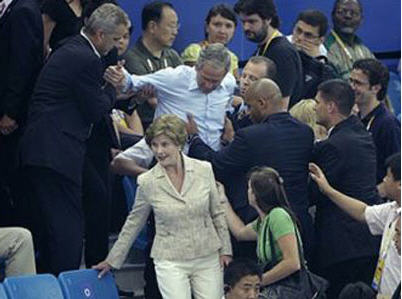The Two Most Essential, Abhorrent, Intolerable Lies Of George W. Bush's Memoir. Part 3 of 7. Article by Dan Froomkin for Huffington Post.
... CONTINUES.
And in June 2008, Senate Intelligence Committee Chairman Jay Rockefeller described the conclusions of his committee's exhaustive report on the Bush administration's public statements regarding Iraq:
Before taking the country to war, this Administration owed it to the American people to give them a 100 percent accurate picture of the threat we faced. Unfortunately, our Committee has concluded that the Administration made significant claims that were not supported by the intelligence. In making the case for war, the Administration repeatedly presented intelligence as fact when in reality it was unsubstantiated, contradicted, or even non-existent. As a result, the American people were led to believe that the threat from Iraq was much greater than actually existed.
It is my belief that the Bush Administration was fixated on Iraq, and used the 9/11 attacks by al Qaeda as justification for overthrowing Saddam Hussein. To accomplish this, top Administration officials made repeated statements that falsely linked Iraq and al Qaeda as a single threat and insinuated that Iraq played a role in 9/11. Sadly, the Bush Administration led the nation into war under false pretenses.
There is no question we all relied on flawed intelligence. But, there is a fundamental difference between relying on incorrect intelligence and deliberately painting a picture to the American people that you know is not fully accurate.
It was, in short, a propaganda campaign. As former Press Secretary Scott McClellan wrote in hisrevelatory 2008 memoir, Bush's advisors "decided to pursue a political propaganda campaign to sell the war to the American people.... A pro-war campaign might have been more acceptable had it been accompanied by a high level of candor and honesty, but it was not."
And as Jonathan Landay wrote for Knight Ridder in 2005, the materials that had become public to date demonstrated "that the White House followed a pattern of using questionable intelligence, even documents that turned out to be forgeries, to support its case -- often leaking classified information to receptive journalists -- and dismissing information that undermined the case for war."
That's what made Patrick Fitzgerald's prosecution of the Valerie Plame case so essential. It promised a public view into the heart of the administration's dirty tricks department -- and a chance to find out once and for all who the mastermind was. But Cheney aide Scooter Libby's lies stymied Fitzgerald, and we never found out for sure -- even though the signs pointed pretty clearly to Libby's boss.

Even if Cheney was the driving force behind the war campaign's deceptions, however, Bush was undeniably the chief cheerleader.
* * * * * * * * * * * * * * * * * * * * * * * * * * * * * * * *
Precisely to what extent pressure from the White House was responsible for the intelligence community's totally inaccurate assessment of Iraq's WMDs remains unclear. Bush's own WMD commission, not surprisingly, gave him a pass in their final report. But there was no doubt the community knew what its chief customers wanted to hear, and gave it to them.
Even so, the intelligence did not support Bush's insistence at the time that those weapons posed an imminent threat.
Paul R. Pillar, the intelligence community's former senior analyst for the Middle East, wrote in 2006 that it was only through the overt, intentional misreading, cherry-picking and politicization of intelligence findings that the case could be made for war:
If the entire body of official intelligence analysis on Iraq had a policy implication, it was to avoid war - or, if war was going to be launched, to prepare for a messy aftermath. What is most remarkable about prewar US intelligence on Iraq is not that it got things wrong and thereby misled policymakers; it is that it played so small a role in one of the most important US policy decisions in recent decades.
Intelligence on Iraqi weapons programs did not drive Bush's decision to go to war, Pillar continued:
A view broadly held in the United States and even more so overseas was that deterrence of Iraq was working, that Saddam was being kept "in his box," and that the best way to deal with the weapons problem was through an aggressive inspections program to supplement the sanctions already in place. That the administration arrived at so different a policy solution indicates that its decision to topple Saddam was driven by other factors.
For Bush, the intelligence findings Cheney and others were feeding him -- and the media -- were not factors that needed to be weighed carefully as part of a decision-making process. There wasno decision-making process. The intelligence findings were simply elements of a sales campaign.
The one time Bush is recorded as having pushed back at the intelligence at all was in the famous late 2002 Oval Office scene with Tenet. However, contrary to popular mythology, Bush's concern was manifestly not about the intelligence itself, but about its marketing potential.
TO BE CONTINUED ...
|
|
|